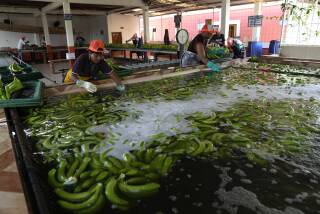Portugal, New Hub of Smuggling into Europe, Steps Up Drug Enforcement Action
- Share via
LISBON, Portugal — Downstairs from an austere police office, a heavily guarded storeroom contains enough confiscated drugs to pay for a Miami condominium.
The office is that of Jose Nunes Goncalves Carvalho, director of the Portuguese Judicial Police drug squad, which is waging war on smuggling. Portugal, at the southwestern tip of Europe, is becoming a main point of entry for South American drug shipments, and authorities here are determined to wipe out the trade.
Cooperation with the United States and other concerned countries has been improved. Border controls are tighter and hundreds of specialized police are working on tip-offs from around the world.
“It’s an all-out fight,” said Carvalho.
No one knows for sure how much contraband slips through, but he and his men are clearly seeing results.
Last year, police seized 1,745 pounds of cocaine and 130 pounds of heroin--more than twice what was intercepted in 1988. Arrests of consumer-traffickers were nearly doubled, to 2,534.
Earlier in July, police seized 460 pounds of South American cocaine.
“They are taking the drug problem very seriously,” one Western diplomat said of the Portuguese crackdown.
In the storeroom below Carvalho’s office, the aroma of hashish fills the air. Police aide Anselmo Semedo Louro pointed to piles of captured drugs waiting to be burned. “This is just the tip of the iceberg,” he said.
Sacks of leaves and white powder are stacked next to false-bottomed suitcases and plastic bags of cocaine.
Drug authorities say that overproduction in South America and falling prices in the United States have forced smugglers into new markets, particularly in Europe.
Its sea and air links across the Atlantic Ocean and Mediterranean Sea make Portugal a convenient transit point to cities such as Frankfurt, Milan or Zurich.
Cocaine often comes into Lisbon on direct flights from Brazil or from Venezuela, which has a large Portuguese community.
Bigger quantities frequently come in containers on cargo shipments. Some drugs are carried in small boats, which use Portugal’s mid-Atlantic Azores islands as a stopping point, Western diplomats say.
Not all that comes in goes out, however. More and more cocaine is being consumed in Portugal, and rising local demand for Asian heroin is alarming authorities.
Estimates of Portugal’s addict population range from 5,000 to 100,000--of 10 million total--but everyone agrees that the numbers are going up.
With Latin American economies in tatters and the Portuguese among the poorest people in Western Europe, there is no shortage of people willing to risk drug-trafficking to earn money, police said.
For instance, they said, a courier can earn $2,000 (about half the annual per capita income in Portugal) and a get a free plane ride for making just one trip.
Authorities have stepped up surveillance at airports, ports and frontiers, and now require visitors from Colombia, Peru and Bolivia to carry visas.
Portugal is also working closely with U.S. agents and the international police organization, Interpol, and has signed accords with West Germany, Morocco, Britain and Spain. Other deals, including one with Brazil, are in the offing.
“There have been cases where the Portuguese authorities have helped enormously, and it has been made known to the British authorities that drugs were being taken to Britain,” British Home Secretary David Waddington said recently in Lisbon.
“As a result of the cooperation between our two countries, important finds of drugs and arrests have taken place.”
One Western diplomat also acknowledged Portugal’s efforts, but said that further work could be done. Law enforcement, in particular, he said, was hindered by the involvement of many agencies that did not always coordinate their actions.
“Catching the stuff at the port of entry is very hit-and-miss,” the diplomat said.
More to Read
Sign up for Essential California
The most important California stories and recommendations in your inbox every morning.
You may occasionally receive promotional content from the Los Angeles Times.













